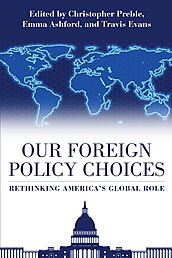Instead, policymakers and political candidates generally embrace the status quo. Bipartisan support exists for extensive alliance commitments, frequent military intervention, and higher defense spending. Though this orthodoxy is unsurprising since many candidates receive advice from a limited number of sources, it is deeply concerning. Debates tend to focus on which specific actions the United States should take, only rarely asking whether the United States should be involved, militarily or otherwise, in various global crises.
Even President Barack Obama, elected in large part thanks to his repudiation of the Bush administration’s conduct of foreign policy, has failed to alter the underlying bipartisan consensus that America remains the “indispensable nation” whose leadership is required in perpetuity. It is easy to see why this idea persists: America’s invaluable and outsized role in protecting the liberal international order during the Cold War was followed by two decades of unipolar primacy, where Washington attempted to exert its influence nearly everywhere.
But, as President Obama has discovered, America’s “unipolar moment” is waning. As he told the Atlantic Monthly’s Jeffrey Goldberg in April 2016: “Almost every great world power has succumbed” to overextension. “What I think is not smart is the idea that every time there is a problem, we send in our military to impose order. We just can’t do that.”
U.S. influence in the world remains preeminent, but with a rising China, a reassertive Russia, and emerging regional rivalries, it is no longer unchallenged. America’s foreign policy cannot simply rely on the business-as-usual policies that have sustained us in recent years. Instead, the country must look to alternative approaches to foreign policy, many of which are better suited to dealing with the complexities of the 21st century.
The United States is the richest, most secure, and most powerful country in the world; therefore, the range of possible choices available to American policymakers is extremely broad. That doesn’t mean, however, that we can avoid choosing, nor that those choices will be easy. America’s foreign policy decisions have an impact on our security, today and in the future, as well as on other nations. In the long term, the lack of debate on foreign policy, by precluding serious consideration of our options, will damage American interests. It will blind us to the changes taking place in the world today and will prevent us from capitalizing on new opportunities to advance U.S. security and prosperity.
This volume seeks to advance this much-needed debate over our country’s global choices, presenting solutions to a number of today’s top foreign policy concerns. These choices are broadly based on a grand strategy of restraint, which emphasizes that America’s global influence is strongest when spread by peaceful — rather than military — means.
Americans are fortunate enough to enjoy substantial security; we rarely need to use our military might. Yet our current grand strategy — known as primacy or liberal hegemony — demands a massive, forward deployed military. That strategy tempts policymakers to use force even when U.S. vital interests are not directly threatened.
To conserve American power and security, a strategy of restraint focuses on avoiding distant conflicts that do not threaten American interests. Restraint argues that the U.S. military should be used rarely and only for clearly defined reasons.
Though restraint forms the basis for the chapters included here, our contributors focus on practical, realistic responses to today’s top challenges. This volume includes chapters focusing on regional threats, broader challenges to national security, as well as some thoughts on how to implement the policy proposals presented here. In some policy areas — such as Syria or Afghanistan — authors advocate a continuation of current policies or relatively minor course corrections, whereas in others — for example, our relations with allies such as Taiwan, Japan, or even the countries in NATO — they suggest a more dramatic approach to U.S. foreign policy in the future.
